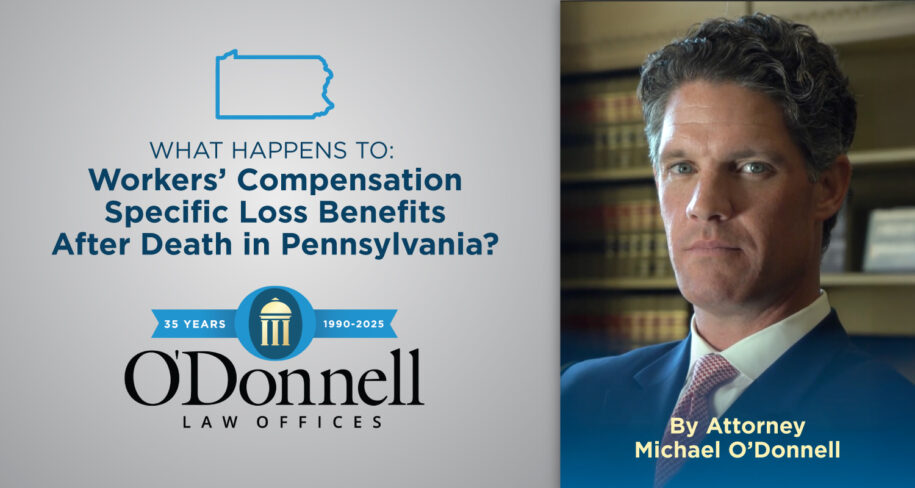Written by Attorney Michael O’Donnell
Generally speaking, the Pennsylvania Workers’ Compensation Act provides for three (3) forms of benefits to injured workers:
- Wage loss benefits when an injury interrupts a worker’s ability to earn a wage;
- Medical benefits covering 100% of the reasonable medical expenses necessary to treat a work injury; and
- Specific loss benefits, which are cash benefits to the injured worker when they suffer the loss of use of a body part (often by way of dysfunction or amputation) or scars to certain areas of their body caused by an on-the-job injury.
Understanding How Specific Loss Benefits Work
The law is set up in such a way that an injured worker cannot collect both total disability wage loss payments and payments for a specific loss simultaneously. The law provides that specific loss benefits are paid after an injured worker stops receiving weekly total disability wage loss payments.
Because of these legally imposed limitations, it is common for an injured worker who has suffered an amputation, permanent scar, or loss of use of a body part to pursue an award of specific loss benefits from a Workers’ Compensation Judge and not begin receiving those payments until they stop receiving their weekly total disability payments.
Workplace injuries involving both total disability and specific loss are frequently some of the most serious and severe injuries we see in this area of the law. I have personally observed situations where these injuries are so devastating that they have, tragically, led to loss of life. When that occurs, the injured worker’s surviving dependents are generally eligible to receive fatal claim benefits and coverage for a set amount of funeral expenses.
What Happens to Specific Loss Benefits After Death?
But what happens when an injured worker suffers a total disability, a specific loss due to amputation, loss of use, or disfigurement, and then passes away before their specific loss benefits are finally decided by the Court and before those payments are made? Does the insurance company just get to keep the specific loss money? Keep in mind, the law provides that specific loss payments do not become payable under the law until after the injured worker’s total disability wage loss checks stop. Like most issues in the law, the answer to the earlier question is: it depends.
Case Example: Recovering Benefits for a Deceased Worker
I had represented a gentleman who suffered a severe work-related injury to his leg. He appropriately received total disability benefits for that injury. Despite best efforts from his medical team, the injury eventually required amputation of his leg below the knee.
With that, he became eligible for specific loss benefits, which were awarded by a Judge. Because my client was receiving total disability payments, the law provided that his specific loss payments would not yet begin. Not long thereafter, my client succumbed to a non-work-related medical ailment and he passed away. He was still receiving total disability wage loss benefits for his work injury when he passed. He never received a penny of the specific loss benefits awarded by the Court.
This brings us back to the question raised earlier: Does the insurance company just keep the specific loss money that had been awarded by the Court? Not this time. After my client’s passing, we took the issue back to the Court with his surviving spouse substituted in his place as the “Claimant.” The law was on our side, but not necessarily for the reasons most would believe.
Section 306(g): Payment of Specific Loss Benefits to Survivors
Section 306(g) of the Workers’ Compensation Act provides that specific loss benefits are payable to the surviving spouse or dependents of the injured worker if they have not yet been paid to the injured worker prior to his death and the injured worker’s death was due to causes unrelated to his work injury. The key factors in our case were that the specific loss benefits had actually been awarded by a judge prior to my client’s passing and his death was due to a medical ailment unrelated to his work injury. Securing the award of specific loss benefits during the injured worker’s lifetime was an important fact to our success in recovering payment of the benefits to his surviving spouse. Additionally, under then-existing precedent, proving that his passing was due to medical ailments unrelated to his work injury provided for a favorable result under Section 306(g).
But what is the result if the injured worker dies while their specific loss benefits claim is still unresolved by the Court, their passing is due to the work injury itself, and the injured worker leaves behind no dependents?
The Pennsylvania Supreme Court recently tackled this issue in Steets v. Celebration Fireworks (WCAB), 335 A.3d 1076 (Pa. 2025).
The key factors for purposes of this analysis are that (1) the injured worker’s passing was due to the injuries she suffered as a result of the workplace incident; (2) the injured worker did not leave behind dependents as defined in the law; and (3) the question of whether the injured worker was owed specific loss benefits was being actively contested and litigated in the Courts at the time she died.
The Pennsylvania Supreme Court, in overruling earlier precedent dating back to 2004, held that Section 306(g) does not limit recovery of post-death specific loss benefits to only those circumstances where the injured worker’s death is due to non–work-injury-related causes. The High Court further examined Section 410 of the Pennsylvania Workers’ Compensation Act and determined that Section 410 allows for the payment of specific loss benefits to an injured worker’s Estate under the circumstances presented in Steets because the injured worker died as a result of her work injuries, did not leave behind dependents, and maintained an active claim for specific loss benefits that had not yet reached a final adjudication at the time of her death. The employer or insurance carrier’s continued contest of the injured worker’s entitlement to specific loss benefits at the time of her death was a key factor in allowing for the application of Section 410 and thus the Estate’s ability to recover the specific loss benefits at issue.
About Attorney Michael A. O’Donnell
Attorney Michael A. O’Donnell is a certified specialist in Pennsylvania workers’ compensation law who represents injured workers and their families across the Commonwealth. A partner at O’Donnell Law Offices, he is known for his strong advocacy, community involvement, and leadership in professional organizations, including the Pennsylvania Bar Association and the Federal Bar Association’s Middle District Chapter. Learn more about Attorney Michael O’Donnell.
O’Donnell Law Offices is a leading personal injury and workers’ compensation firm serving Wilkes-Barre, Scranton, and communities across Northeastern Pennsylvania. Our experienced team of trial attorneys represents clients in complex cases involving workers’ compensation, specific loss benefits, personal injury, motor vehicle and trucking accidents, premises liability, and Social Security Disability. With decades of proven results and board-certified expertise in Pennsylvania workers’ compensation law, we fight to protect the rights of injured workers and their families—ensuring they receive the full benefits and justice they deserve.

